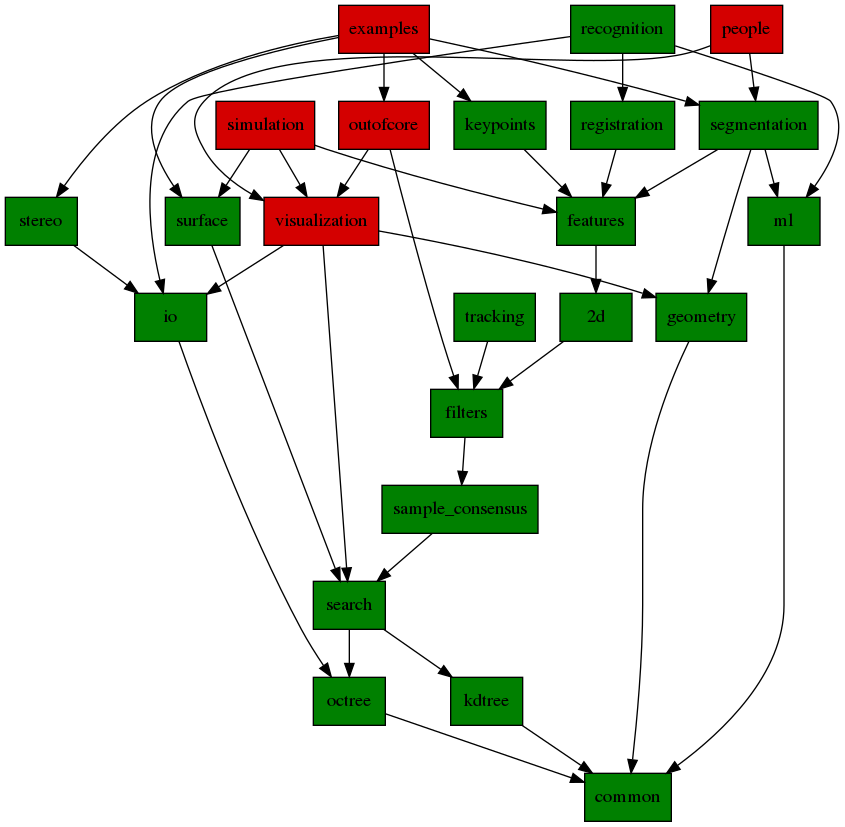-
-
Notifications
You must be signed in to change notification settings - Fork 4.6k
FAQ_devel
~/src/pcl-trunk/doc/tutorials$ make rm -rf html /tmp/doctrees sphinx-build -b html -a -d /tmp/doctrees content html Making output directory... Running Sphinx v1.0.1
Extension error: Could not import extension sphinxcontrib.doxylink.doxylink (exception: No module named sphinxcontrib.doxylink.doxylink) make: *** [html] Error 1
A: $ sudo easy_install -U sphinxcontrib-doxylink
(if you get an: error: command easy_install not found, do this: sudo apt-get install python-setuptools*)
(Quick note: If the problem persists, sphinx may be using a version of python for which doxylink is not installed - to find out which sphinx-build binary is being used, use ccmake and enter the advanced mode and look for SPHINX_EXECUTABLE. If you look at the top of that executable you can see which version of Python it is using)
Line : void convolve (PointCloud &output); Errors : C:/BuildAgent/work/30b7299afa31c293/2d/include\pcl/2d/convolution.h(129, 0): error C2143: syntax error : missing ')' before '<' C:/BuildAgent/work/30b7299afa31c293/2d/include\pcl/2d/convolution.h(129, 0): error C2143: syntax error : missing ';' before '<'
A : Using pcl::PointCloud instead of PointCloud solved the problem for me.
-
Dependency graph generation requires a dot file generated while building the project with CMake:
mkdir build && cd build && cmake {pcl_source_path}For more information, see Compiling
-
PCL's dependency graph can be generated via:
cd build && convert pcl.dot pcl_dependency_graph.png
-
To generate one without the transitive dependencies, for a cleaner output, use:
cd build && tred pcl.dot | dot -T png > pcl_dependency_graph_nontransitive.png
All the PCL exceptions should inherit from pcl::PCLException class.
This is an example
class PCL_EXPORTS MyException : PCLException
{
MyException (const std::string& error_description,
const std::string& file_name = "",
const std::string& function_name = "",
unsigned line_number = 0) throw ()
: pcl::PCLException (error_description, file_name, function_name, line_number) { }
}
- Modify your nvvc.profile file (usually in /usr/local/cuda/bin/nvvc.profile) and add the following line at the top:
compiler-bindir = /home/[user]/sbin/gcc-4.4to tell NVVC to use gcc-4.4 to compile CUDA code. /home/[user]/sbin/gcc-4.4 should contain links to 4.4 version of gcc/g++ like this:
0 lrwxrwxrwx 1 user 1001 16 2011-07-01 16:12 c++ -> /usr/bin/g++-4.4
0 lrwxrwxrwx 1 user 1001 16 2011-06-16 12:59 g++ -> /usr/bin/g++-4.4
0 lrwxrwxrwx 1 user 1001 16 2011-06-16 12:59 gcc -> /usr/bin/gcc-4.4
For completing the test_io unit tests, you need to install language-support-de, i.e.:
apt-get install language-support-de
or
apt-get install language-pack-de
This is an outdated guide, see the "Preparing Releases" page instead
- make sure you update the PCL_VERSION variable in the
CMakeLists.txtof the branch that you're trying to release from - make sure all the unit tests pass for all platforms (check
build.pointclouds.organd set up custom tests) - write up the Changelist to http://dev.pointclouds.org/projects/pcl/wiki/ChangeList
- tag the release in svn, e.g.:
git tag <tagname>
- send an e-mail to the list (pcl-users
and pcl-developers) - post a news announcement on pointclouds.org